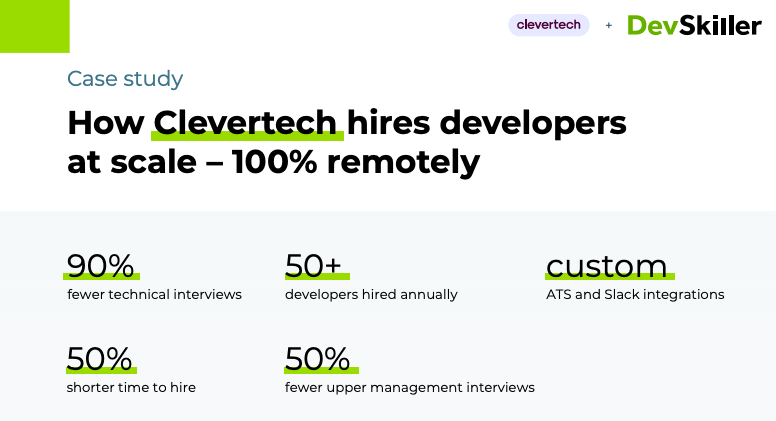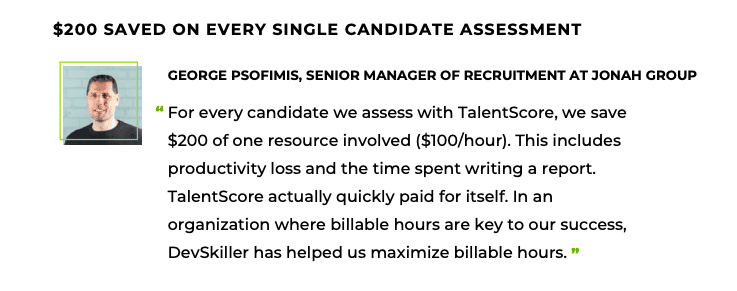
Is recruitment automation critical for technical hiring success?

Recruitment automation is one of the driving forces bringing success to technical recruiters. Just how essential is it though? Should all technical hiring teams be looking at recruitment process automation? Here we discuss the arguments for and against automation.
What is recruitment automation?
Recruitment automation is the process of designating certain elements of the recruiting process to be carried out by machines to save on manual labor.
“93% of organizations and workers face barriers to accessing the digital skills they need to remain competitive.“
2021 AWS Global digital skills study,
This increases the pressure on tech recruiters to deliver the right hires—at a quicker pace than ever. Adding more strain to an already difficult job.
Automation is an attempt to alleviate some of that strain of recruitment without reducing the quality of candidates. The goal is to increase the standard of candidates in the pipeline. While simultaneously increasing the rate at which new candidates are hired.
An alternative to automating this process is to use staff augmentation companies. This is where, for your hiring needs, you collaborate with a company that already has a large talent pool and effectively “rent” its experts. However, many still prefer the traditional approach of actually hiring tech experts who work for your company full-time.
Examples of recruitment automation
Some examples of recruitment process automation are:
- Pre-employment assessments
- Applicant tracking systems (ATS)
- Automated Resume screening
- Automated interview scheduling
- Candidate Sourcing
What are the benefits of recruitment automation?
The benefits of automation can vary from company to company. However, some universal benefits can be identified.
Recruitment automation can save on Time-to-Hire
Companies can save on the time it takes to bring in each new hire. For instance, if the technical screening process is automated, then fewer candidates will progress to the interview stage. The success rate will not be subjectively decided, but rather decided based on objective, technical skills, that are assessed automatically.
Clevertech used DevSkiller TalentScore to automate their technical screening process and cut down on 90% of their technical interviews.

Source: Clevertech and DevSkiller case study
Companies can also save on time-to-hire by fast-tracking the best performing candidates—making sure they don’t drop out of the pipeline. The same if your company was to automate the scheduling of interviews. This is another step in the process that would no longer need to be handled manually by your employees.
By automating areas of the recruiting process, you are freeing up the time of your hiring staff.
“14 hours a week is the average amount of time HR managers say they lose to manually completing tasks that could be automated.”
ideal
Watch below as Mindera explain during a DevSkiller live discussion, why the company needed to implement a screening tool like TalentScore into its screening process.
Read our Mindera case study
Automating your recruitment process can save your company money
“78% of business leaders believe that automating tasks in the organization increases productivity for everyone involved.”
frevvo
Despite paying to use applicant tracking systems or automated technical assessments like DevSkiller TalentScore, many companies are still saving countless hours of billable time when it comes to making new hires by following the path of recruiting automation.
Take the example of George Psofomis, Senior Manager of Recruitment at Jonah Group, discussing the company’s decision to implement TalentScore:

Without automation, Jonah Group was spending hours interviewing candidates. The company automated its technical screening process using DevSkiller TalentScore and managed to make significant savings per candidate.
If all of the steps mentioned in the section above are automated, your tech company will no longer need developers to physically evaluate technical assessments. The same with hiring staff to send out tests. The more automated the most arduous parts of the recruiting process become, the more hours of physical labor will be saved. Labor which can be better spent making your company money elsewhere.
Read the full Jonah group case study
Recruitment automation can improve candidate experience
If your whole recruitment process is quickened up and streamlined, then it becomes more organized. There is less strain on your hiring staff and so they are likely to be more approachable and positive. In turn, candidate experience also increases. When a candidate is awaiting the results of an automated technical assessment, for instance, if the results are automatically generated, then there is no waiting around. Likewise when it comes to automatically sourcing candidates.
According to Amazing Hiring– “AI automated sourcing saved up to 45% of the time spent on sourcing compared to traditional manual sourcing.”
The faster the recruitment process, the more candidates remain in the pipeline. Meaning the less candidate drop-off your company will have.
Photo by Tima Miroshnichenko – Pexels
Recruitment automation can increase Quality of Hire
Automation means hiring managers are no longer relying on resumes for self-written endorsements of quality. Automation allows recruiters to actually assess the relevant skills of each candidate. To assess how well they will perform within the role. Only the best candidates remain in the funnel. Meaning, that when it comes to making a hiring decision, only the best candidates still remain to choose from.
Companies leverage this by designing fast-track paths for the most promising candidates. Ensuring that good quality candidates don’t slip through the cracks and drop out of the pipeline.
This can have a positive knock-on effect for your company in general. If all of the hires you make between now and this time next year are from the best available candidates, then this will increase the pressure on workers already at the company. It will encourage them to pick up their game and make sure they aren’t made to look bad.
When should a company implement recruiting automation?
- If your company is scaling and you are looking to significantly increase the number of hires you make.
(Even if you’re not expanding on a large scale, there may still be arguments that you should be looking to automate).
- Recruiter dissatisfaction:
If your recruiting staff get overwhelmed by applications or you struggle to narrow down the best candidates, then this may be a sign to automate your screening.
- Candidate drop off:
The same if your recruiting process is so long that you often have candidates dropping off in the pipeline. While hiring external recruiters to help out, or regularly taking employees away from their regular duties to have to read through resumes or evaluate assessments, can also be signs that automation could improve your situation.
- Hiring in locations where tech talent is scarce:
In areas where talent shortage is bigger than average, the volume of applications is high, while their quality is often low.
Try comparing your company to competitors of the same size. Ask yourself – what are their hiring methods? Will automation help you get ahead?
Not sure if your company needs a tech screening solution?
Download our free Tech Screening readiness ebook to find out.
Where to implement recruitment automation in your hiring process?
There are several key areas of recruitment in which to invest in automation:
Candidate pre-screening
AI can now be used to automatically ‘read’ a candidate’s CV. It can be used to identify their skills and decide whether or not they are more qualified than other candidates. This simple time-saving tool can save hours of pouring through bad resumes to find the right candidate.
Source – Pexels Photo by Alex Green
Pre-employment assessments
Pre-employment assessments are tests that often replicate the real work the candidate will do. They offer a chance to accurately test the capabilities of each candidate in a way that is both objective and measured. Accidental bias is ruled out because automation is responsible for choosing the most qualified candidates.
Learn more about how to hire more effectively with pre-employment assessments
Sourcing automation
One of the most time-consuming parts of recruitment, particularly for tech recruiters, is sourcing candidates. It can be very difficult for hiring managers to know where to look to find the right candidates. Fortunately, this is one of the responsibilities within recruitment that can be automated.
Sourcing automation works by profiling thousands of candidates from various data collection sources and matching them with the skills listed in your open position. These candidates can then be contacted through sites like Linkedin.
Use chatbots
The recruiting process is often slowed down. Not only by companies not knowing how to write a good job description, but by the questions from potential candidates. Even a good job description can occasionally lead to follow-up questions. You can save your hiring team endless hours of email writing by implementing automated chatbots into your recruitment process. Wherever your job posting is listed on your site, chatbots can work around the clock to answer most questions that a candidate may have. Freeing up the time of your recruiters and quickening the time that it takes for the right candidate to apply.
In the example shown below, chatbots are used to answer some of the simple questions a candidate might have. Tasks such as this can be easily automated, leaving hiring managers with more time to focus on the areas that do require the human touch. For the candidate, they have the answers they need, without any waiting around. Meaning, that they are more likely to stay within the pipeline, than if they had to wait for a response.
Source: Joonbot
Problems with automation
So, are there any downsides to automation? Well, in short, yes there are some. If you are replacing humans with machines, then this is surely likely to lead to a lack of roles for humans and a rise in unemployment, right?
According to frevvo in its summary of the Future of Jobs report – “31% of organizations are worried about labor displacement and the job loss that could come from job automation and artificial intelligence.”
Although this would seem like a perfectly sound argument for anyone who is against automation, the situation might not be as clear cut as it seems.
A lot of companies are already aware that automation could lead to a rise in unemployment. As a result, many have started their own in-house training and reskilling initiatives to counteract this issue. To make sure that existing employees are not being squeezed out, but simply moved into areas that do still require the human touch.
“To tackle this concern, organizations are looking to internally redeploy almost half of the workers who will be displaced by automation instead of capitalizing on automation-based labor savings.”
frevvo
Can automation be off-putting to potential candidates?
Many companies are apprehensive about implementing automation into their hiring process because they fear it will take away the personal, human touch. After all, a recruitment process that doesn’t include any human interaction, might not exactly be the warm welcome to a new company your candidate was hoping for.
However, your automation is designed to assist humans, not to replace them entirely. Many companies that have successfully implemented automation into their recruitment practices, have done so by using the technology in some areas, but keeping the human touch where it matters most.
Take the example of the Cognitive Automation Community, in their article Why machines will always need that human touch:
“We’re fine letting them (machines) handle transactional matters where we’ve established rules that even the simplest AI couldn’t possibly botch. But we still want a pilot on a plane.”
Cognitive Automation Community
We can take this example as a metaphor that can be applied to the technical hiring process.
In technical recruitment, implementing automation into your screening process will save countless, billable hours of a recruiter’s time. However, it is wise to keep certain human ‘touch points’ throughout the process. For instance, having your hiring team arrange and carry out the candidate interviews that follow. Similarly, automation might be used to send out emails to candidates asking if they would like feedback, but the feedback itself should be provided by a human. Someone who understands the contrasting emotions that come with delivering positive or negative feedback better than a machine.
The point being, that automation is a tool for humans to use. It is something that is at its best when still benefitting from human involvement. So, as long as your company makes sure to maintain a certain level of human involvement, then there is no reason why automation can’t be used to speed up and streamline your technical hiring process.
Read – Tech Talent trends and predictions for 2022
In summary
Automation is the future. In almost every aspect of modern life, automation will begin to take hold as time progresses. If you want your company to be part of tomorrow, then it’s important to embrace the changes that come with it. Automating certain aspects of your recruitment process may be just the start.
Implementing applicant tracking, automated sourcing, and pre-screening assessments into your everyday hiring processes, can alleviate the workload of your employees. You can hone in on the best candidates in the pipeline and make sure that they don’t slip through the cracks. In the long run, this will raise the quality of employees across your company.




